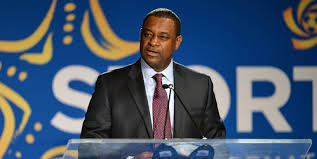By Andrew Warshaw
September 9 – It will hardly come as a surprise since he was not planning on making a comeback. The question is, why did it take so long? The life ban imposed last week on former FIFA vice-president and CONCACAF boss Jeffrey Webb, the toughest possible FIFA sanction, was the final damaging blow to the Cayman Islands banker who was once held up a bastion of fair play and touted as a possible president of world football’s governing body.
Webb, like so many powerbrokers before him, has been banned from all football-related activities by FIFA’s ethics committee as well as being fined $1 million for taking bribes. He had already been provisionally suspended in May 2015 after being placed under investigation, but the term of that suspension had run out a long time ago.
When Webb was named as CONCACAF’s president in 2012 it seemed his career was only going one way as the fresh voice of honesty the region craved following the notorious reign of Jack Warner. Then came the shocking revelation of how Webb and others solicited and accepted millions of dollars in bribes from marketing firms and executives in exchange for sponsorship and media rights for regional tournaments.
In November last year, Webb pleaded guilty in a New York court to racketeering, conspiracy, wire fraud and money laundering six months after being caught up in that notorious dawn raid at a Zurich luxury hotel by Swiss police acting on a US warrant.
The raid ultimately led to the downfall of a swathe of FIFA leaders and the uncovering of a $150 million-worth of corruption scandals stretching back 20 years.
When found guilty, Webb promised to forfeit more than $6.7 million in assets and was confined to house arrest. He is expected to be formally sentenced later this year.
Webb’s life ban came on the same day the ethics committee opened a formal file against former FIFA president Sepp Blatter (generally reckoned to be the prime target of the US investigation) and two of his former key aides, Jerome Valcke and Markus Kattner, that will look into potential violations of rules governing loyalty, conflicts of interest and bribery in the context of salaries and bonuses.
In June an internal FIFA report by US lawyers Quinn Emmanuel found Blatter, Valcke and Kattner “enriched themselves” through pay rises and bonuses worth £55 million over five years. Blatter has already been given a six-year ban for making a “disloyal” payment to UEFA president Michel Platini in 2011 and recently took the case to the Court of Arbitration for Sport which could well cut the ban to four years as it did with Platini.
Yet efforts to clear his name have now been further compromised after he, former finance director Kattner and one-time secretary-general Valcke became the subjects of this new investigation into allegations of financial misconduct, with Kattner facing a further charge related to a breach of confidentiality, understood to concern the leaking of information about current FIFA president Gianni Infantino.
Valcke, who served as Blatter’s right-hand man as secretary general at FIFA from 2007 to 2015, was given a 12-year ban from all football-related activity in February for misconduct related to his expenses, the use of FIFA resources and the sale of World Cup tickets. Kattner, who was Valcke’s deputy, has not been sanctioned before but was controversially sacked in May without, he insisted, a fair hearing.
Contact the writer of this story at moc.l1714045027labto1714045027ofdlr1714045027owedi1714045027sni@w1714045027ahsra1714045027w.wer1714045027dna1714045027

